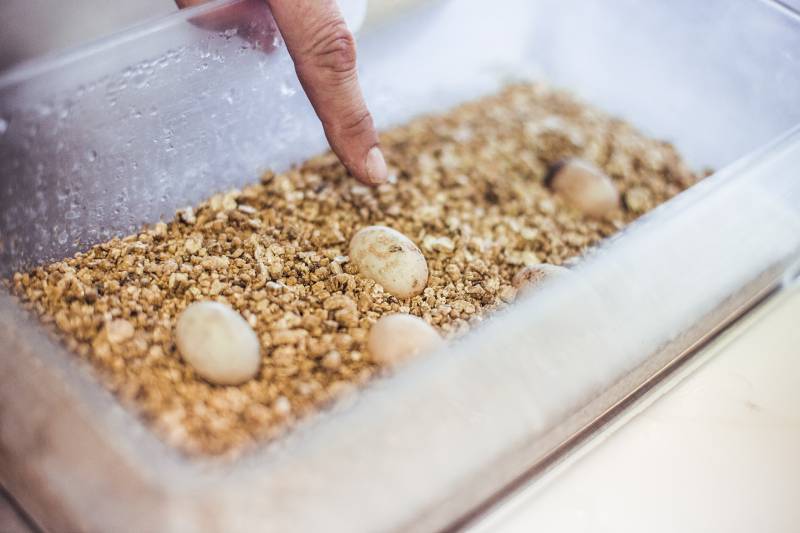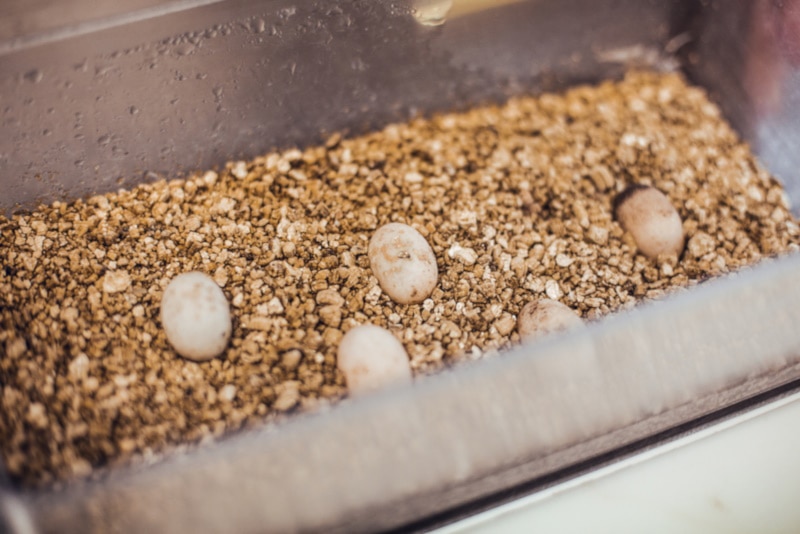10 Best Turtle Egg Incubators – 2024 Reviews & Top Picks

Updated on

A turtle egg incubator can be as simple as a tub with some incubation substrate and a means to keep the eggs away from the substrate. Or it can be as advanced as an automatic incubator with adjustable temperature and humidity settings, which is especially beneficial if you struggle to maintain a suitable temperature of around 80°F for incubation. Unlike poultry eggs, turtle and other reptile eggs need to be kept stable and shouldn’t be moved, so while some poultry egg incubators are suitable, not all will be.
There is a wide range of incubators for you to choose from, across a very broad budget range, so to help you find the best turtle egg incubator, we have compiled reviews of the best. Read them below, along with a guide to help you choose.
A Quick Comparison of Our Favorites in 2024
| Rating | Image | Product | Details | |
|---|---|---|---|---|
| Best Overall |

|
ZooMed ReptiBator Digital Egg Incubator |
|
Check Price |
| Best Value |

|
Shuohu Small Pet Egg Incubator |
|
Check Price |
| Premium Choice |

|
R-Com Juragon Pro Digital Reptile Egg Incubator |
|
Check Price |

|
DOHO Reptile Egg Incubator |
|
Check Price | |

|
Hova-Bator Still Air Egg Incubator Kit for Reptiles |
|
Check Price |
The 10 Best Turtle Egg Incubators
1. ZooMed ReptiBator Digital Egg Incubator – Best Overall
| Incubator Type: | Digital |
| Temperature Control: | Yes |
| Humidity Control: | Display Only |
| Material: | Styrofoam |
A digital incubator includes some degree of temperature and humidity control that enables you to keep your turtle eggs in ideal conditions. It contains some type of heater that will warm the air to the desired temperature. In the case of the ZooMed ReptiBator Digital Egg Incubator, you have temperature control with settings between 59°F and 104°F but while the incubator displays humidity settings between 10% and 95%, it doesn’t automatically control the humidity. There are water reservoirs and a ventilation system that you can adjust to get the humidity to the desired 80%, but this can fluctuate if you don’t maintain the water levels appropriately.
The ZooMed is a digital incubator, so is more expensive than manual models, but it is reasonably priced for one with temperature control. It also includes a temperature alarm, and an LCD screen to display temperature and humidity, and it has a clear lid so that you can check in on the eggs without disturbing them. The relatively low cost of the ReptiBator combined with the thermostatically controlled temperature and LCD screen make this the best available turtle egg incubator, but its Styrofoam construction feels flimsy, and you will need to take care to ensure you don’t damage it.
- Digitally controlled temperature settings between 59°F and 104°F
- Multiple reservoirs and ventilation systems for humidity control
- Reasonable price for a digital incubator
- Styrofoam construction is flimsy and easily damaged
2. Shuohu Small Pet Egg Incubator – Best Value
| Incubator Type: | Manual |
| Temperature Control: | None |
| Humidity Control: | None |
| Material: | Plastic |
If you have decent temperature and humidity control around your turtle enclosure, a manual incubator costs a fraction of the price of a digital model and will effectively do the same job. The Shuohu Small Pet Egg Incubator is a plastic incubator tray. It can hold up to 12 eggs in the slotted tray compartment, which is kept above and away from the incubation substrate, therefore preventing mold and other problems that can occur if the eggs come into contact with the vermiculite.
There is also a center slot for holding a thermometer, although no thermometer is included with the tray. The tray is made of plastic, which is stronger than Styrofoam, and it is well constructed. The Shuoho Small Pet Egg Incubator is very basic, but it is well made and is the cheapest incubator on the list, making it the best turtle egg incubator for the money.
- Inexpensive
- Sturdy construction
- Eggs are lifted away from the incubation media
- Very basic
- Thermometer not included
3. R-Com Juragon Pro Digital Reptile Egg Incubator – Premium Choice
| Incubator Type: | Digital |
| Temperature Control: | Yes |
| Humidity Control: | Yes |
| Material: | Plastic |
The R-Com Juragon Digital Reptile Egg Incubator is a digital egg incubator that does virtually everything for you. Put the eggs in the incubator and you can either run it manually by choosing the desired temperature and humidity or, easier still, choose the type of eggs that you have put in the tray and let the R-Com do the rest for you. It has automatic temperature and humidity control, as well as a display, and it runs very quietly. It can hold up to 90 eggs depending on the size of the eggs, so you should have plenty of room for a clutch or two of turtle eggs.
However, while the PX-R90 is an advanced incubator that is ideal for those who want a hands-off approach to egg incubation, it is very expensive, costing the most of any incubator on our list. It uses a heater but doesn’t have the functionality to cool temperatures down, so it needs to be placed in an area that is cooler than your desired temperature otherwise it can be difficult to manage the temperature accurately.
- Automatically controls temperature and humidity
- Holds up to 90 eggs
- Very easy automatic settings
- Very expensive
- Can struggle to control temperature in warm rooms
4. DOHO Reptile Egg Incubator
| Incubator Type: | Manual |
| Temperature Control: | No |
| Humidity Control: | No |
| Material: | Plastic |
The DOHO Reptile Egg Incubator is similar to the Shuohu Small Pet Egg Incubator in that it is a basic incubator with a raised tray that sits above the substrate. The tray has slots so that air is allowed to circulate, preventing temperature differences, reducing the risk of mold, and increasing the hatch rate of eggs.
However, unlike the Shuohu, it doesn’t have a slot to hold a thermometer and it does cost more. It is made from sturdy plastic, which is rated as food-grade plastic so won’t give off any harmful toxins when being warmed, and the lids are shaped such that you can stack multiple incubators in a pile. It is also easy to wash.
- Thick plastic is sturdy with a good seal
- Plastic tray keeps eggs away from substrate
- Tubs can be stacked for storage
- More expensive than similar models
5. Hova-Bator Still Air Egg Incubator Kit for Reptiles
| Incubator Type: | Digital |
| Temperature Control: | Yes |
| Humidity Control: | Display Only |
| Material: | Styrofoam |
The Hova-Bator Still Air Egg Incubator Kit for Reptiles is an inexpensive digital incubator kit. It includes the digital incubator, several plastic tubs, and vermiculite incubator substrate, so you have everything you need to incubate turtle eggs. It does use a thermostat so it can automatically reach and maintain the desired temperature, but it only displays humidity which is essentially controlled by adding liquid to the substrate.
Unlike some other incubators, the Hova-Bator has the eggs sit directly in the vermiculite, which some breeders don’t like because it can cause mold or rot, and it tends to mean slightly different temperatures at the bottom and top of the eggs. It’s also made of Styrofoam, and the cups are quite thin plastic, but the Hova-Bator is very well-priced, will ensure a reasonable hatch rate in most cases, and it has viewing windows through which you can check on progress and ensure appropriate conditions.
- Very inexpensive digital incubator
- Kit includes an incubator, cups, and even the incubation substrate
- Temperature can be digitally controlled
- Tray and cups are a bit flimsy
- Eggs sit directly in the substrate
6. SOYEAHZ Reptile Egg Incubator
| Incubator Type: | Manual |
| Temperature Control: | No |
| Humidity Control: | No |
| Material: | Plastic |
The SOYEAHZ Reptile Egg Incubator is a plastic incubator tray. It has a tray that sits above the substrate so the eggs don’t come into contact with the vermiculite. Each of the 14 egg compartments has slots to allow airflow and to ensure an even temperature around the whole tray, and the lid design means that you can stack several of the tubs if you are trying to hatch multiple clutches. The trays and the tubs are easy to clean, which means that you can use them time and time again without having to pay for replacements.
However, it is a basic design and, although it certainly isn’t expensive, there are cheaper alternatives that offer the same kind of functionality as the SOYEAHZ.
- Tray keeps the eggs away from the substrate
- Tubs can be stacked
- Tray holds up to 14 eggs
- Very basic functionality
- Similar styles are available for a little less money
7. OrangeA Black Reptile Egg Incubator
| Incubator Type: | Digital |
| Temperature Control: | Yes |
| Humidity Control: | Display Only |
| Material: | Plastic |
The OrangeA Black Reptile Egg Incubator is a reasonably priced digital incubator that can be used to hold several incubator trays and to maintain a steady temperature. It has a digital thermostat and both heats and cools, so it should work well in rooms that are cooler or warmer than the desired temperature. And the temperature can be controlled between 5°C and 60°C, which is equivalent to 41°F and 140°F and more than enough for turtle eggs. There are two trays that can be removed if needed, and the incubator can be powered by AC or DC so it can even be used to keep temperatures stable during transit as it can plug into a car power supply.
However, the OrangeA Black Reptile Egg Incubator does not offer humidity control, other than a water tray at the bottom, and there isn’t a hygrometer, so you will need your own digital hygrometer. Also, the temperature display is set in Celsius and can’t be changed, which means that you will have to work out the conversion yourself whenever you read it.
- Digital control temperature from 41°F to 140°F
- Can hold multiple incubator trays
- Can be powered by AC or DC power
- Temperature reading is Celsius and can’t be changed
- No hygrometer to measure humidity levels
8. NEWCOMDIGI 16 Grids Reptile Eggs Incubator Tray
| Incubator Type: | Manual |
| Temperature Control: | Thermometer Display |
| Humidity Control: | None |
| Material: | Plastic |
The NEWCOMDIGI 16 Grid Reptile Eggs Incubator Tray is another plastic incubator tray that uses suspended incubation. This means that the tray holding the eggs is kept above the level of the substrate below. It ensures a more even temperature and because the damp substrate doesn’t directly come into contact with the egg, it prevents mold from forming, which can lead to the loss of your eggs and hatchlings.
Not only does the tray have space for a thermometer, but it also includes a basic thermometer, which is easily viewable through the transparent, heavy-duty plastic lid which also makes it easy to see the progress and condition of the eggs. The tray can hold up to 16 eggs, which is slightly more than most similar models, but the inclusion of the thermometer also means that this one costs more than a lot of the basic tray models. And the lack of ventilation holes means it can be difficult to maintain the desired humidity levels.
- Includes a thermometer
- Can hold up to 16 eggs
- Good, thick plastic material
- Quite expensive for a basic tray
- No hygrometer or ventilation
9. Exo Terra Precision Incubator Pro
| Incubator Type: | Digital |
| Temperature Control: | Digital |
| Humidity Control: | Digital |
| Material: | Styrofoam |
The Exo Terra Precision Incubator Pro offers digital temperature and humidity control, with the humidity control being especially useful and not found on all incubators. The incubator is made with Styrofoam walls and insulation. It has a 55-watt heater that helps achieve the desired air temperature and there is an LED display screen to show the current temperature and humidity levels.
The Exo Terra is a little pricey but that’s due to the inclusion of a digitally controlled humidifier. However, it is made using Styrofoam, so it feels flimsy, and it struggles to bring temperatures down to the desired range, so it will perform best in a room that is cooler than the incubation temperature you’re trying to achieve. The lack of decent ventilation means that mold can be an issue, so you will need to monitor carefully.
- Offers digital temperature and humidity control
- LED screen displays temperature and humidity levels
- Styrofoam construction
- Ventilation isn’t great
- Not great at cooling to desired temperature
10. JOBEDE 16 Grids Reptile Breeding Box
| Incubator Type: | Manual |
| Temperature Control: | None |
| Humidity Control: | None |
| Material: | Plastic |
The JOBEDE 16 Grid Reptile Breeding Box is a plastic incubator box that can hold up to 16 small reptile eggs. It has a slot for a thermometer, but the thermometer is not included. The tray is held above the level of the substrate, so mold shouldn’t be a problem, and the plastic is both durable and easy to wash, so the incubator can be reused.
Although it is a reasonable tray, and it can stack, it is quite expensive considering there is no thermometer included and it is a basic model. Managing humidity levels can be a challenge due to the lack of holes, so you will have to open and close the tray and buy a hygrometer as well as a thermometer.
- Good quality plastic
- Suspended incubation prevents mold
- No thermometer included
- Ventilation is poor
- Quite expensive for a basic model with no thermometer
Buyer’s Guide: Choosing the Best Incubators for Turtle Eggs
Although some species of sea turtles lay 100 eggs or more, most pet turtle clutches will consist of up to 15 eggs. The eggs need to be kept warm and in a humid environment that closely mimics the conditions they would experience in the wild. A temperature of 80° Fahrenheit is ideal with a humidity level of 80%. These conditions are difficult to meet without the use of some kind of incubator. They may survive and hatch successfully if left in the enclosure, as long as your turtle has been able to lay them in an appropriate place. Using an incubator generally improves the hatch rate of a clutch so that you end up with more hatchlings.
What Conditions Do Turtle Eggs Need to Incubate?
Turtle eggs do need specific conditions to incubate and hatch. They need a temperature of 80°F and a humidity level of 80%. Unlike some poultry and bird eggs, they should be kept still and stable, so you don’t turn them, and you should avoid using incubators that automatically rotate the eggs.
Do I Need an Incubator?
Turtle eggs can hatch without an incubator if the mother has been able to lay the eggs in a suitable location with appropriate conditions. Using an incubator increases the hatch rate of a clutch, though, because it means that you can keep the eggs in ideal and stable conditions. It also means that you can keep an eye on the eggs and ensure they are in good general condition.
Manual vs Digital Incubators
- Manual incubators are tubs, usually made from plastic or Styrofoam. The bottom of the tub is filled with an incubation medium like vermiculite, and a tray sits above this medium. The tub does retain heat, although its capability to do so is ultimately determined by the material it is made from and the environmental conditions it resides in. Manual incubators are inexpensive and basic, but you need to find ways to provide heat and humidity yourself. One way of doing this is to use them in conjunction with a digital incubator.
- Digital incubators have heaters and usually include a water reservoir or some other place to add water. They include a thermometer and temperature display and will usually also offer a digital hygrometer display to show the humidity level. Some provide thermostatically controlled temperature control and some, but certainly not all, provide digitally controlled humidity settings.
Temperature Control
Turtle eggs need to be kept at a temperature of 80°F but can be kept to a temperature within 2°F of this. That’s quite a narrow margin and sticking to this temperature can mean the use of heaters and fans to heat or cool the air. While virtually all digital or automatic incubators have a temperature display showing the current temperature, some also offer digital temperature control. These use a thermostat similar to those used in central heating systems. The thermostat determines the current temperature and turns a heater on or off to achieve the desired temperature. Digital temperature control does help ensure stable temperature within the incubator.
Humidity Control
Humidity is the amount of water vapor in the air and the ideal level for turtle eggs is 80 ounces of water vapor per cubic meter of air. Humidity is controlled by adding water to the incubator. The water can be added to the substrate that is used or in reservoirs and trays in the interior of the incubator. A hygrometer is used to measure humidity, and some digital incubators do offer humidity control. These usually have an exterior water reservoir and if more humidity is required, the water is pumped from the exterior reservoir to an interior reservoir until the humidity reaches the desired level.
Humidity control is not as common as temperature control and is usually controlled manually by the addition and removal of water and by the opening and closing of the incubator.

Material
The material an incubator is made from is important. It needs to retain heat and help maintain a constant temperature and humidity within the incubator. The most common materials used are plastic and Styrofoam. Both are good insulators for the purpose, but while Styrofoam feels flimsy and can be accidentally damaged easily, plastic tends to be tougher and more resilient.
Frequently Asked Questions
How Long Does It Take for Turtle Eggs to Hatch in An Incubator?
The time it takes for turtle eggs to hatch depends on the species of turtle as well as the conditions the eggs are incubated in. It can take anywhere from 45 to 90 days for the eggs to hatch.
How Do You Know If a Turtle Egg Is Fertilized?
Female turtles, like hens, can lay eggs even when they have not bred. These eggs will be infertile and will therefore not contain an embryo. When turtle eggs are first laid, most are a pink-white color and somewhat translucent. After a few days, the embryo will develop and this will cause chalking, which means that the egg starts to turn a white color and will become more opaque. Chalking usually starts at a single spot and expands until the whole egg has changed color. If an egg does not start chalking it was likely unfertilized to begin with.

Do Turtle Eggs Need Sunlight to Hatch?
Turtle eggs do not need sunlight to hatch, and in most cases, they are laid in holes in the sand or dirt, in the wild. They do need appropriate temperature and humidity levels, but you won’t need to provide any UB lighting.
What Is the Best Substrate for a Turtle Egg Incubator?
Generally, the substrate in an incubator is used to aid in humidity. The substrate holds water which gradually adds moisture to the air. Vermiculite is the most commonly used substrate because it retains water but releases moisture easily. It is also reasonably affordable and clean.
Conclusion
Turtle eggs are delicate and need handling properly while also being provided with appropriate environmental conditions to ensure they survive. An incubator helps achieve and maintain the appropriate temperature and humidity levels needed while keeping the eggs in a safe and stable environment.
Above, we have included reviews of the best turtle egg incubators including the ZooMed ReptiBator Digital Egg Incubator which offers digitally controlled temperature settings at a reasonable price for an automatic incubator. The Shuohu Small Pet Egg Incubator is a really inexpensive, albeit very basic, incubator that is good if you have a controlled environment you can keep it in—but you will need a thermometer and hygrometer to monitor conditions. Our premium choice is the
R-Com Juragon Pro Digital Reptile Egg Incubator, that automatically controls temperature and humidity and holds up to 90 eggs.
Featured Image Credit: Aitor Lamadrid Lopez, Shutterstock
























